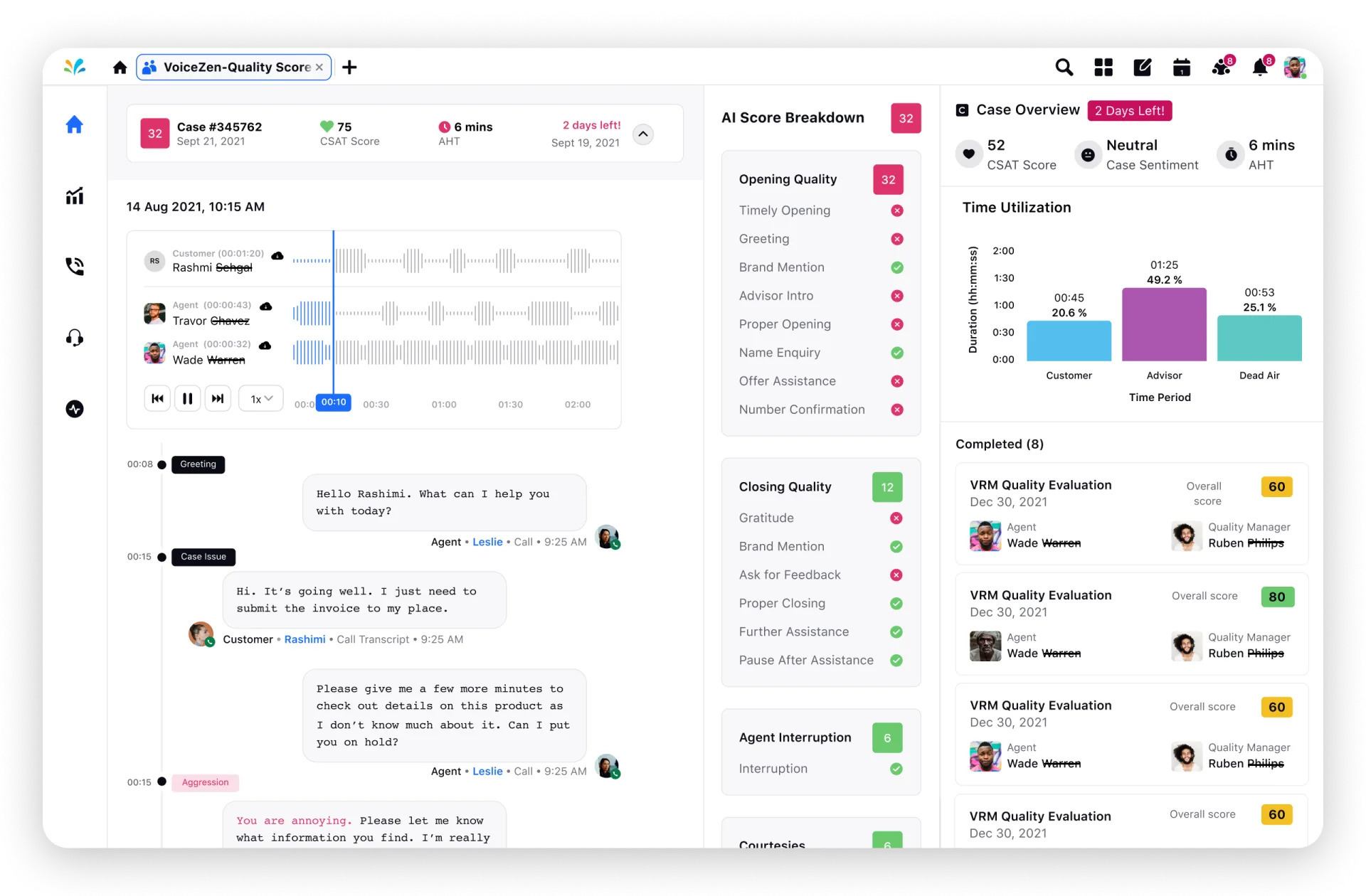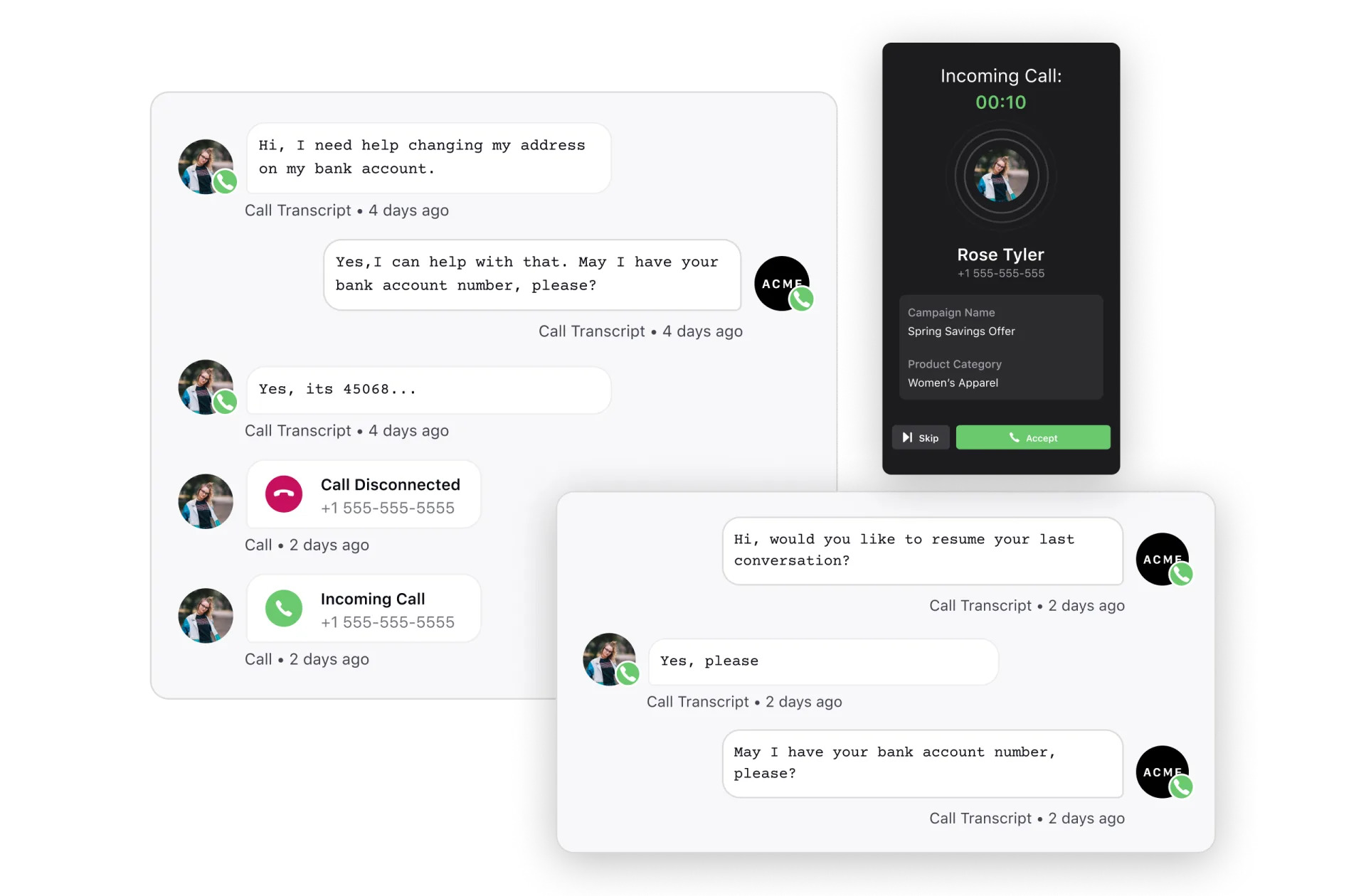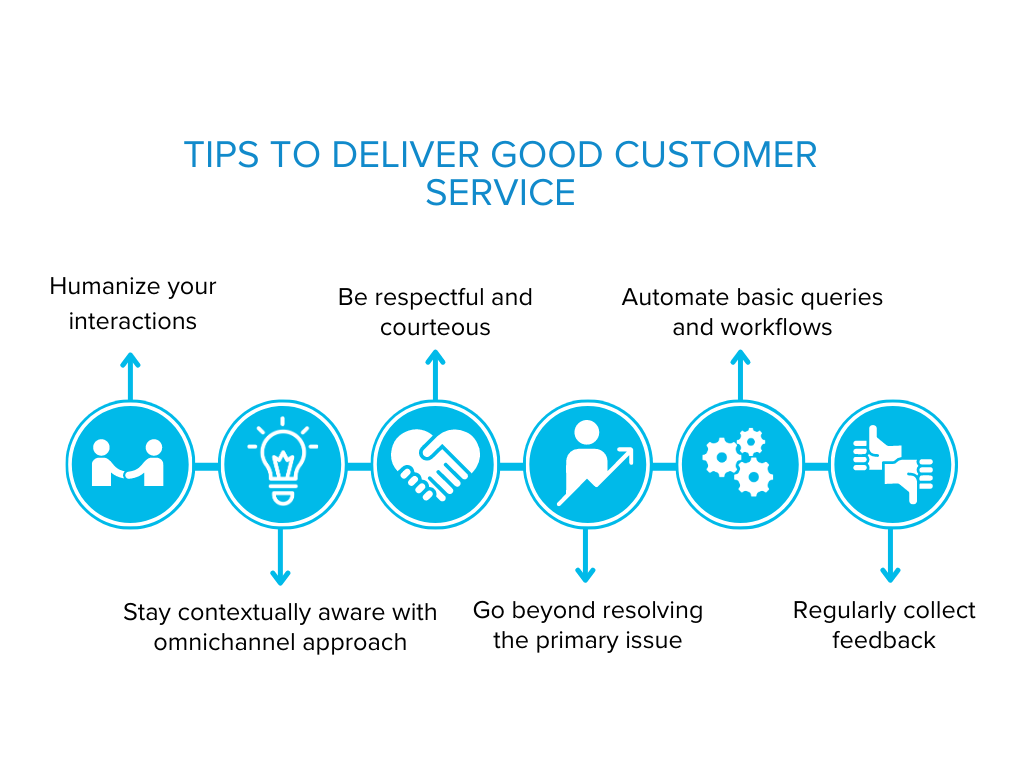- What is customer service in a call center?
- Types of call center services
- Why customer service matters to businesses?
- Responsibilities of call center agents to improve customer service
- Top skills for excellent customer service in a call center
- Tips to deliver good quality customer service in a call center
- Is holistic customer service a priority in your call center?
What is customer service in a call center?
Customer service in a call center is the frontline support and assistance call center agents provide to customers when they reach out for help or have inquiries. It's about promptly addressing your customers’ needs, resolving their issues and delivering positive service experiences.
To provide great customer service, agents use empathetic communication, active listening and personalized problem-solving. Call centers use different technologies to make communication simpler for everyone — call center agents and customers.
Automated Call Distribution (ACD) System routes incoming calls to the right agents based on predefined rules like agent skills in order to deliver faster resolutions
Customer Relationship Management (CRM) Software manages customer information, interactions and customer history to help personalize service
Interactive Voice Response (IVR) System allows customers to navigate through self-service options using voice or keypad inputs
Computer Telephony Integration (CTI) integrates phone systems with computer systems to enable screen pops and automatic call logging
Predictive Dialer automatically dials a list of numbers, predicting agent availability to minimize idle time
Call Recording System records and archives calls for quality assurance, training and dispute resolution purposes
Call Monitoring Software allows supervisors to listen to live or recorded calls to provide agent coaching and maintain service quality
Now, let’s understand the diverse services call centers provide.
Types of call center services
Call centers are multifaceted. Businesses set up their call centers to serve specific purposes. However, there are two key types of call centers. Let’s take a look at them.
1. Inbound call center
An inbound call center is a dedicated facility or department that primarily handles incoming calls from customers seeking help, information or support. The services an inbound call center provides are:
General information: handling basic inquiries like customers requesting for brochures or catalogs, or needing guidance on company policies, procedures or terms
Order management: efficiently managing orders, including order placement, tracking, modifications and cancellations — to ensure end-to-end order fulfilment
Troubleshooting: diagnosing and troubleshooting technical issues, guiding customers through step-by-step resolutions to restore functionality and minimize downtime
Account inquiries: assisting customers with account-related questions, such as balance inquiries, updating personal information or addressing billing discrepancies
Appointment scheduling: managing appointment bookings, cancellations and rescheduling to ensure accurate calendar management
2. Outbound call center
In the simplest terms, an outbound call center makes all outgoing calls to customers and prospects. It is primarily engaged in proactive customer outreach, sales efforts and survey cycles. An outbound call center provides the following services.
Sales and lead generation: reaching out to potential customers, promoting products/services and generating leads to drive sales
Customer follow-up and retention: maintaining customer relationships with post-purchase or post-service calls, sending payment reminders and driving upsells and cross-sells
Customer reactivation: re-engaging dormant or inactive customers with special promotions or personalized incentives to encourage their return
Market research and surveys: conducting surveys and collecting feedback to gather insights and understand customer needs to support business decision-making and strategy development
Market updates and notifications: informing customers about important updates, such as product launches, service enhancements, policy changes, or industry-specific news
While most call centers fall under these two categories, some call centers follow a hybrid model — which handle both inbound and outbound calls.
Moreover, call centers can be divided into two buckets basis the number of channels they serve:
Multichannel: active across several, independent communication channels
Omnichannel: active on multiple channels as well but with a unified data approach for customers to switch platforms without losing context
Know more: All about omnichannel customer experience
And that's not all! The various types of call center customer services directly contribute to the incredible benefits customer service brings. Now, let's explore why customer service is truly paramount for businesses.
Why customer service matters to businesses?
Customer service is a brand differentiator. It’s no longer a good-to-have but an essential element to any business’s long-term success. Here are the benefits of having a call center customer service.
Benefits of call center customer service
1. Master conflict resolution
Call center customer service excels in handling challenging situations.
Skilled representatives possess the art of diffusing tensions, calming frustrated customers and navigating through conflicts with finesse. By effectively resolving issues, call centers can salvage customer relationships, prevent potential negative reviews and enhance brand reputation.
2. Amplify brand advocacy
Exceptional call center customer service has the power to transform customers into passionate brand advocates.
Call centers create happy customer experiences by addressing concerns in time and exceeding expectations. When happy customers are vocal about a brand on public forums, it leads to increased brand recognition, new leads and a surge in positive word-of-mouth.
It also makes customers more likely to recommend you to their friends and families, boosting your average net promoter score (NPS).
3. Fetch strategic insights
In customer service, a thriving call center is a catalyst for growth and a source for invaluable customer insights.
Conversational IVR uses powerful AI capabilities to go beyond the basics:
Actively listen to customers to uncover hidden pain points and unmet needs
Surface emerging trends and insights that aren’t immediately apparent
Drive strategic innovation, refine products and shape future business strategies.
With the help of powerful analytics, agents and supervisors can dive into the quality of each conversation as seen below. They can detect customer’s tone, CSAT scores, case sentiment and various call quality metrics.

To truly enjoy the benefits of exceptional customer service, it's essential that your agents fulfill their responsibilities diligently and follow the best customer service techniques.
Responsibilities of call center agents to improve customer service
The role of a call center agent is pivotal during every customer call. And they are expected to deliver top-notch service at every touchpoint. Let’s take a look at a few responsibilities and duties of a call center agent.
1. Provide exceptional support and build relationships
Call center agents are customer experience architects, crafting customer relationships through genuine rapport and nurtured trust.
They transcend transactional exchanges, delving into the intricacies of each customer journey — to understand the user problems and deliver the right solutions. Call center agents are intuitive problem-solvers, expertly personalizing their communication style to adapt to diverse personalities and preferences of their customers.
2. Display high emotional quotient in tense situations
Emotionally charged-up customers can often ramble into heated one-sided monologs. One of the top responsibilities of a call center agent is to remain composed when a customer blows up at them.
A truly responsible agent understands that the need to arrive at a solution is paramount in such situations. Instead of emotionally engaging, they often:
Listen patiently and empathize with the user
Recognize root problem and validate their concerns
Provide swift and compassionate support
3. Make interactions as painless as possible
Customer service agents often find it overwhelming to retrieve information from customers.
Repeatedly asking for the same details is not only frustrating for customers, but also time-consuming for agents.
When call center agents maintain a unified customer view, they make things essentially effortless in two ways:
Past interactions enable agents to pick up conversations right where the customer left it off
Collective information from all interactions helps agents anticipate customer needs before they even arise
With astute observation and a proactive mindset, agents must offer relevant answers without fatiguing customers.
Check out this conversation below.
In this scenario, the customer needed to update their account details, but unfortunately, the call got disconnected before they could finish. However, when the customer called back, the agent skillfully resumed the conversation without asking the customer to repeat any information.

Top skills for excellent customer service in a call center
Customer service is a customer-facing function. Call center agents must possess phenomenal people-skills to excel at it. Not only that, but they also need to have a clear understanding of the end objectives and the quality standard that must be met. Here are eleven skills needed for excellent customer service.
Communication: clear and effective communication to understand customer needs and provide helpful solutions.
Critical thinking: analytical and troubleshooting skills to identify and resolve customer issues efficiently.
Resilience: remaining calm and in-control when dealing with challenging customers
Attentiveness: actively focusing on customers' concerns and responding appropriately.
Adaptability: adjusting and responding flexibly to different customer personalities and situations.
Time management: efficiently organizing and prioritizing tasks to provide timely customer support.
Product knowledge: possessing in-depth understanding of products or services to offer accurate guidance.
Positive demeanor: maintaining an optimistic and friendly attitude to create a positive customer experience.
Multitasking: the ability to handle multiple tasks simultaneously while maintaining focus and delivering exceptional service to each customer
Persuasion: influencing and persuading customers respectfully to promote product or service benefits and meet sales targets
Cultural sensitivity: demonstrating awareness, respect and an inclusive mindset towards diverse cultural backgrounds
Learn more: 10 customer service training tips to coach your agents
Tips to deliver good quality customer service in a call center

Good quality customer service is a delicately crafted function that directly influences brand perception. The strategies you employ decide how effective and efficient your service really is. Take a look at a some of the best practices to get it right.
1. Take an H2H, not a B2H approach
B2H = Business to Human
H2H = Human to Human
Customers don’t want to be dealt with like a business cohort. They expect human connection and want to see if you genuinely care about them. Your agents must display that. Go beyond scripted responses and be authentic when speaking to customers.
2. Stay contextual, provide help everywhere
Look into transforming your phone-first call center into an omnichannel contact center. Be available where your customers want you to be. Build a contact center that takes into account every touchpoint in the customer’s journey on every channel — phone, video, voice, social and offline.
An omnichannel service approach also helps minimize customer effort, as agents are always aware of the specifics of the situation.
3. Always be courteous
Respect given is respect earned. Customers reaching out for help are already going through a problem. Your job is to help them, not further aggravate them.
Keep your cool and command the situation with grace. Be kind, use “please” and “thank you” religiously.
4. Leave no stone unturned
Giving a satisfactory resolution is good. But going the extra mile will have your customers raving. Go beyond basic resolution and consider giving them another helping hand. Customers love perks like:
A no-cost service or repair
An additional upgrade
A free extension on warranty
Coupons
Early-bird access
Personalized discounts
5. Automate, automate, automate
Call centers are flooded with calls at any given minute. Don’t expect customers to understand your daily predicament. Deploy call center automation tools to bypass queued customers through self-service tools like FAQ chatbots, knowledge base and product help repositories.
Also read: Customer service automation guide
6. Refine your service with feedback
First-hand feedback is the best way to understand varying customer perspectives. Reach out to customers through regular surveys to gain insight into your process. They might help you recognize issues with your handling times, resolution quality or agent expertise.
Is holistic customer service a priority in your call center?
In the evolving customer service landscape, traditional call center operations fall short.
Outdated technologies, like clunky IVR systems, limit smooth experiences. Customers calling in often also bear the brunt of disjointed interactions.
To tackle such pain points, a refined and transformed contact center is imperative. An all-in-one contact center as a service (CCaaS) is the answer to all customer and agent woes.
Sprinklr Service marries data from 30+ channels to make customer service truly an experience everybody enjoys.
Agents are always in-the-know of what customers need
Customers can rest easy knowing the agents know what they are doing
It’s a win-win for all. If that sounds like something you would like to try, register for a demo today.
Thank you for contacting us.
A Sprinklr representative will be in touch with you shortly.
Contact us today, and we'll create a customized proposal that addresses your unique business needs.
Request a Demo
Welcome Back,
No need to fill out any forms — you're all set.


